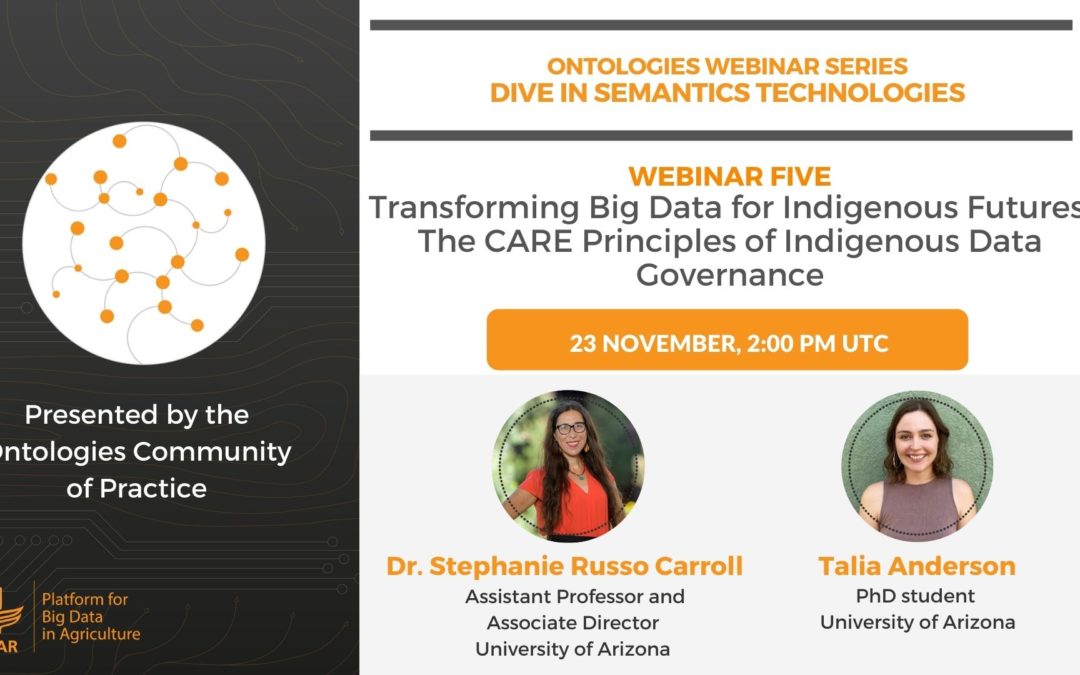Webinar – The CARE Principles for Indigenous Data Governance
This webinar by the Ontologies Community of Practice presents the CARE Principles for Indigenous Data Governance. Given that most Indigenous data are held by non-Indigenous governments, institutions, and agencies, increasing Indigenous Peoples participation in data governance activities is central to realizing Indigenous data sovereignty.
In this webinar Dr. Stephanie Russo Carroll and Talia Anderson present the CARE Principles for Indigenous Data Governance.
The current shift to big data, open science, and open data does not fully engage with Indigenous Peoples rights and interests. Over the past five years, Indigenous data sovereignty has become a movement to increase both Indigenous access to Indigenous data and Indigenous leadership within data governance. Given that most Indigenous data are held by non-Indigenous governments, institutions, and agencies, increasing Indigenous Peoples participation in data governance activities is central to realizing Indigenous data sovereignty.
How can organizations like CGIAR (1) support the creation of new institutional frameworks that center the terms of Indigenous communities around research and data partnerships and (2) enact policy and practice changes that protect and strengthen Indigenous Peoples’ relationships with their data, information, and knowledge?
Speakers
Dr. Stephanie Russo Carroll – Assistant Professor and Associate Director at the University of Arizona
Talia Anderson – PhD student at the University of Arizona
Timeline
00:01:34 Presentation discussion
00:27:35 The word co-creation of knowledge has been present much more often recently. Assuming that you are familiar with it, a) How do you understand the concept of co-creation of knowledge? b) How is it articulated to CARE-FAIR? – Francisco J. Rosado-May
00:30:15 Knowing the guidelines for making sure the information collected protects indigenous/communities, how about if the researcher is an Indigenous person? What adaptations can be made to the guidelines? (Remember the Coyote story mentioned by Harris 2002). – Francisco J. Rosado-May
00:33:10 Can you share examples of workflows/best practices already in place at universities or institutions that are trying to provide attribution of indigenous authors and data providers that we could use as a starting point? – Maria Garruccio – Alliance Bioversity-CIAT
00:37:30 Is there a community of practices around the CARE principles? – Maria Garruccio – Alliance Bioversity-CIAT
00:39:01 What are your connections with the genetics resources treaty regarding data in the context of the Nagoya protocol? – Elizabeth Arnaud- Alliance Bioversity-CIAT
00:40:50 How to reach the data assessor mentioned by Talia? – Elizabeth Arnaud- Alliance Bioversity-CIAT
00:43:03 Are there guidelines on how to include community surveyed as co-authors? – Elizabeth Arnaud- Alliance Bioversity-CIAT
00:45:20 Mention of the FAIRscribe, the FAIR data publication workflow developed by CGIAR as a potential solution to tackle the CARE principles. Medha Devare- IFPRI/Big Data Platform
00:47:10 Reflective approach of the agronomy context regarding Indigenous data. – Guideon Kruseman- CIMMYT
00:51:05 We should recognize the importance of the way in which that knowledge was created. – Francisco J. Rosado-May
November 26, 2021





